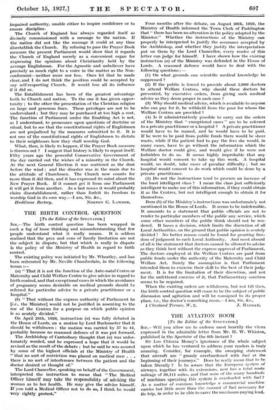THE BIRTH CONTROL QUESTION [To the Editor of the SPECTATOR.]
SIR,—The birth control question has been wrapped in such a fog of loose thinking and misunderstanding that few people understand what it really means. It is seldom realized that the pros and cons of family limitation are not the subject in dispute, but that which is really in dispute is the policy of the Ministry of Health in regard to birth control.
The existing policy was initiated by Mr. Wheatley, and has been reiterated by Mr. Neville Chamberlain, in the following terms
(a) " That it is not the function of the Ante-natal Centre or Maternity and Child Welfare Centre to give advice in regard to birth control, and that exceptional cases in which the avoidance of pregnancy seems desirable on medical grounds should be referred for particular advice to a private practitioner or a hospital."
(5) " That without the express authority of Parliament he [i.e., the Minister] would not be justified in assenting to the use of the Centres for a purpose on which public opinion is so acutely divided."
On April 28th, 1926, instruction (a) was fully debated in the House of Lords, on a motion by Lord Buckmaster that it should be withdrawn : the motion was carried by 57 to 44, probably because no reasoned defence of it was put forward.
The Archbishop of Canterbury thought that (a) was unfor- tunately worded, and he expressed a hope that it would be revised as the result of the debate ; but he said he was assured by some of the highest officials at the Ministry of Health " that no sort of restriction was placed on medical men . . . there is no sort of interference between the patient and the doctor desired or thought of."
The Lord Chancellor, speaking on behalf of the Government, interpreted the instruction to mean that " The Medical Officer himself may take the responsibility of advising the woman as to her health. He may give the advice himself. If you told a Medical Officer not to do so, I think he would very rightly protest."
Four months after the debate, on August 20th, 1926, the Ministry of Health informed the Town Clerk of Paddington that " there has been no alteration in the policy adopted by the Minister." Whether the instructions of the Ministry can
properly be interpreted to justify the assurance accepted by the Archbishop, and whether they justify the interpretation put on them by the Lord Chancellor, every reader of this letter can judge for himself. I have shown how the existing instruction (a) of the Ministry was defended in the House of Lords. A reasoned defence would have to deal with the following questions:—
(1) On what grounds can scientific medical knowledge be suppressed ?
(2) If the public is forced to provide about 2,000 doctors to attend Welfare Centres, why should these doctors be prevented, by executive orders, from giving such medical advice as they deem proper in each case ?
(3) Why should medical advice, which is available to anyone who can pay for it, be withheld from the poor for whom the Welfare Centres are provided ?
(4) Is it administratively possible to carry out the orders of the Ministry that " exeeptional cases " are to be referred to a private practitioner or a hospital ? A private practitioner would have to be named, and he would have to be paid. If he were to be paid from public funds there would be sheer waste, while if the patient had to pay the fees she would, in many cases, have to go without the information which the Welfare doctor could give, and would give if he were not
forbidden to do so. It seems highly improbable that any hospital would consent to take up this work. A hospital would, no doubt, take cases of peculiar difficulty ; but no hospital would consent to do work which could be done by a private practitioner.
(5) Do not the instructions tend to procure an increase of the least intelligent class ? I mean the class just sufficiently intelligent to make use of this information, if they could obtain it at the Centres, but not intelligent enough to obtain it for themselves.
Item (b) of the Ministry's instructions was unfortunate!: not mentioned in the House of Lords. It seems to be indefensible.
It amounts to a statement that public officials are not to sender to particplar members of the public any service, which some other members of the public think should not be ren- dered. It bases a decision, which limits the discretion of all Local Authorities, on the ground that public opinion is acutely divided ! No better reason could be found for granting free- dom of judgment to each Local Authority. And most absurd of all is the statement that doctors cannot be allowed to advise as they think best without the express approval of Parliament.
The doctors employed at the Welfare Centres arc paid from public funds under the authority of the Maternity and Child Welfare Act. Surely the assumption is that Parliament intended them to exercise their skill to the best of their judg- ment. It is for the limitation of their discretion, and not for the unfettered exercise of it, that Parliamentary sanction seems to be required.
When the existing orders are withdrawn, but not till then, the birth control question will cease to be the subject of public discussion and agitation and will be consigned to its proper place, i.e., the doctor's consulting room.—I sin, Sir, &c.,


















































 Previous page
Previous page